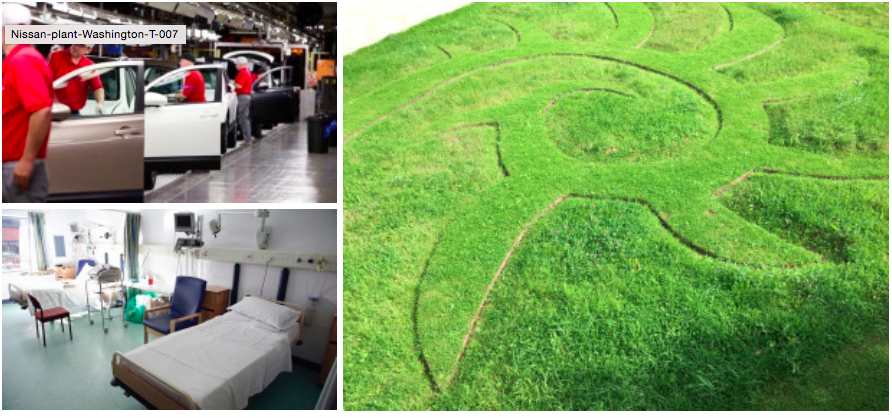Taiichi Ohno’s 7 Wastes

(By John Atkinson)
There is often confusion as to the term system thinking. For some it means improvement processes, maybe based in the Toyota Production System (TPS). For others it means considering systems as living things and the mechanistic tools of vehicle production seem the antithesis of what is required.
For me viewing the world as a living system means that such polarity of thought is rarely helpful. Almost invariably there is more value in finding the connection between binary opposites than in arguing the value of one over the other. So here, I’ll take one of the founding fathers of lean improvement systems and look at it in a human context.
I learned a lot about lean processes by studying at the world’s most efficient car production plant. Incidentally that was and still is the Nissan plant at Washington, Sunderland, not Toyota. And isn’t it interesting how a word for a living thing ‘plant’ is used to describe a mechanistic process? Do we grow cars or assemble them?
At Washington I was pointed at two masters of improvement thinking, Iwao Kobayashi and his 20 Keys and Taiichi Ohno. Here I’m going to take a little look at Ohno’s seven wastes (or mudas) and think about them in the context of a living system, like the system that helps people keep healthy and well where they are living. The seven wastes are particularly relevant in the light of the reductions in spending that the english public sector faces.
1) Defects
This is the simplest form of waste. It is stuff that doesn’t meet the specification. How many services do we provide that don’t pass the ‘Ronseal challenge’ i.e. they don’t do what they set out to? Hundreds I should think. Why is this? Because people present with complex and variable conditions. There isn’t the same stability in a human system as there is in a manufacturing one. If our service focuses simply on ‘providing food’ to ensure no child goes hungry it misses that some families cannot afford to heat the food we give them or even know how to cook it.
2) Over Production
Make only what is required. We provide a number of universal services. Not everybody really needs them. And some people who need them don’t need them all the time. I vividly remember a conversation with a reformed class A drug user who told me every service we gave her was useless with the exception of A&E (which really was a lifesaver). Then one day, she genuinely resolved to change and every service was invaluable.
3) Waiting
This is all about the flow through a system. The costs of someone waiting for treatment or care may not be felt in the organisation causing the wait. Yet the costs can mount in other organisations. Delayed transfers of care (DToC) from hospital are a very good example of this. By fragmenting our relationship with an individual into so many constituent parts across so many organisations we create a process of delays and waste to the individual and the state.
4) Transporting
Every time you need to move something it costs you. Councils are currently slashing their transport costs by removing services. This does’t necessarily take cost out the wider system as individuals still need to move to the point of provision. Yet co-locating services, although well-practised by some isn’t habitual as individual organisational identities, power structures and concerns over risk continually obstruct the process. People facing a single incident in their life find it hard dealing with multiple agencies to resolve it.
5) Movement
This is about our people moving about. Travel time between appointments is something that has been targeted by independent care organisations through not paying travel to first appointments and zero hours contracts. As these start to unravel in the courts, the cost of this waste is starkly highlighted for organisations whose margins and operating models have taken repeated hits over the last five years. If these become untenable what happens then?
6) Inappropriate Processing
This is working harder than we need to and is an obvious form of waste. Public services have a habit of over-specifying, either by attempting to provide a quality of service defined by professional bodies that is higher than needed, by responding to the demands of regulators not users or employing staff on exemplary conditions of service.
7) Inventory
This is holding too much stock. This is where manufacturing in the UK first focused so much attention yet probably holds less value where your primary business is a service. None the less, how might we create more effective supply chains so we don’t sit on expensive stocks when our workflows are irregular and triggered by widely differing events?
For me Myron Roger’s three questions sit really well alongside the seven wastes. Myron asks:
- How do living systems work?
- How does this system work?
- How do I work in and with this system?
Understanding our responses to these questions better, and keeping this understanding in the forefront of our minds, might yield significant benefits when looking at the seven wastes.